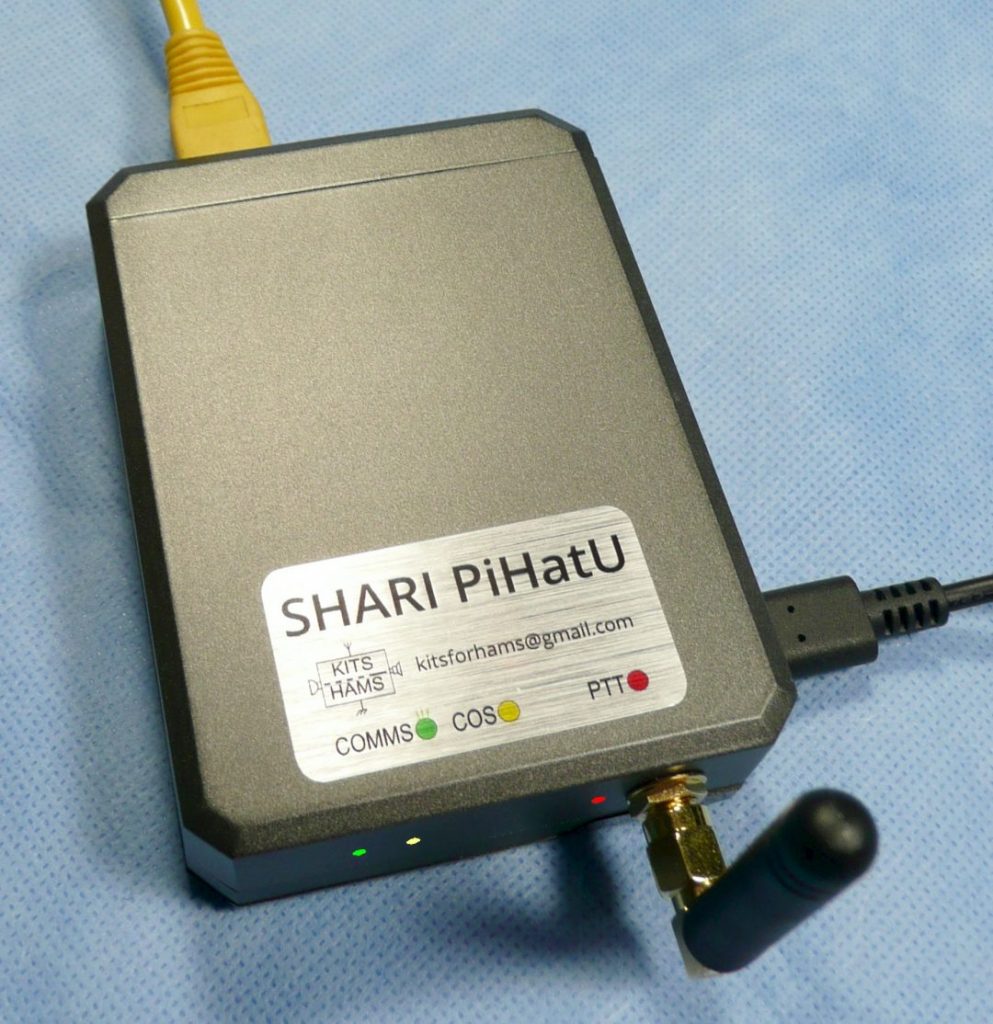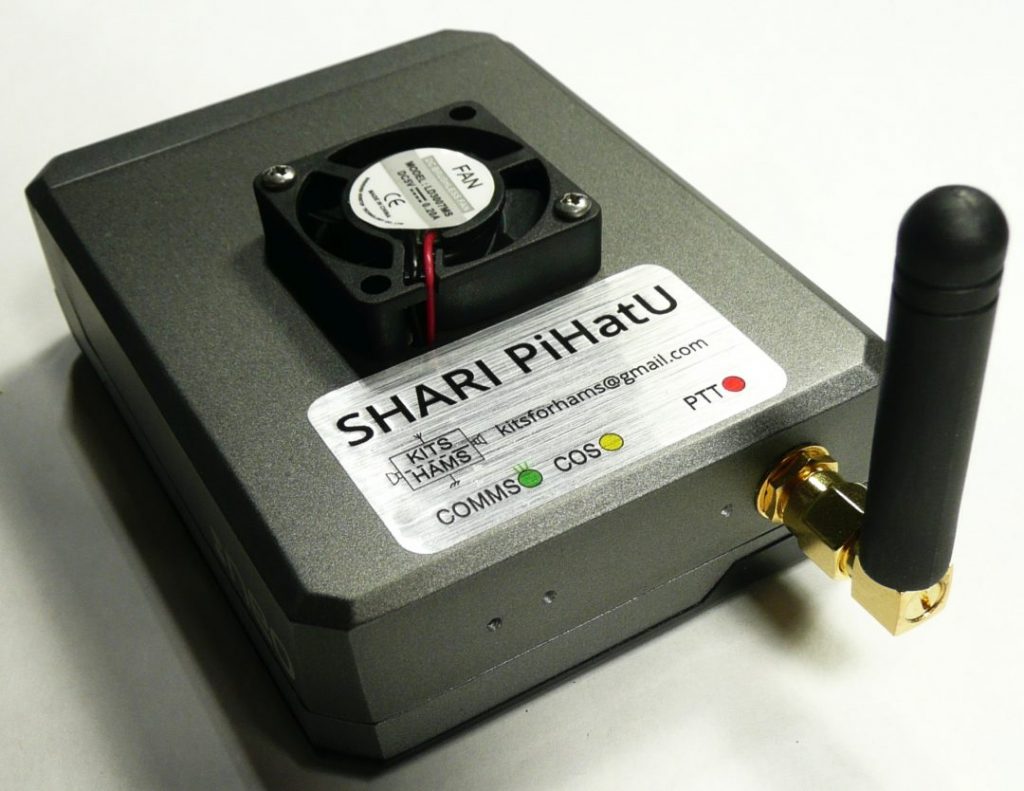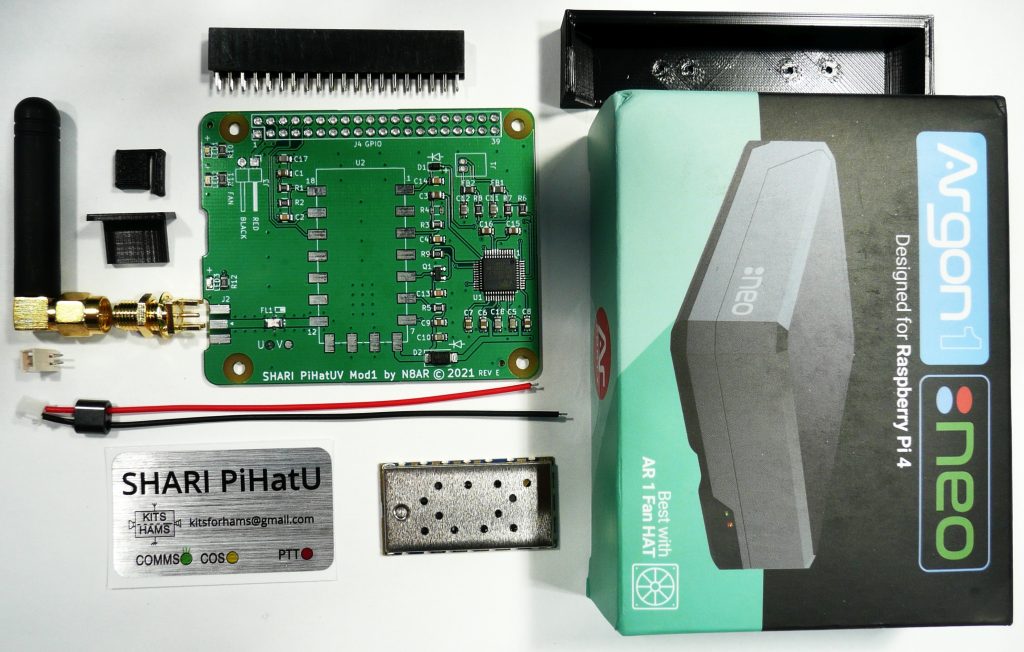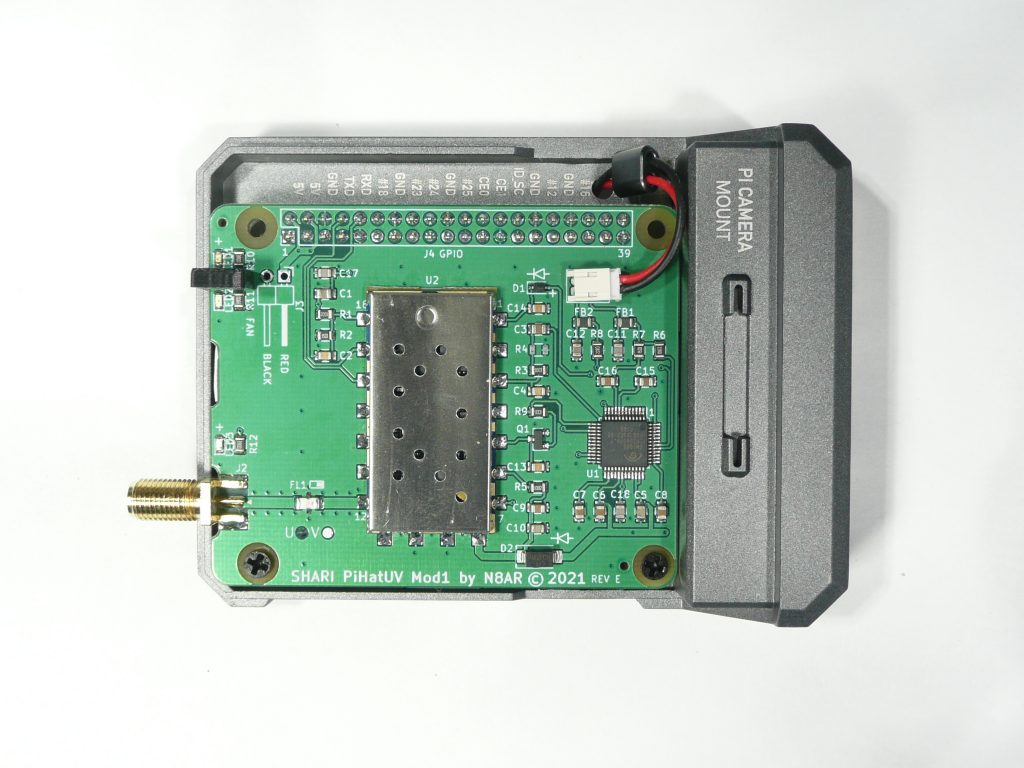Overview
SHARI (SA818 Ham Allstar Radio Interface) PiHat NeoPi4 is a ham construction project designed by N8AR that implements a Raspberry Pi hosted Allstar node in an Argon40 Neo case for the Raspberry Pi4B. It includes a NiceRF SA818S embedded UHF (420 – 450 MHz) or VHF (144-148 MHz) radio module. SHARI PiHat NeoPi4 is designed as a kit for construction and use in the amateur radio service by licensed amateur radio operators who can assure that their assembled SHARI PiHat NeoPi4 kit meets FCC mandated operating requirements including RF frequency, deviation and required power levels at the fundamental and harmonic frequencies.
A SHARI PiHat NeoPi4 uses a custom PC board (PiHat type) which plugs into the GPIO connector on top of a Raspberry Pi4B. Two wires from the PiHat are soldered to pads on the Pi4B for a USB connection. Programming of the SA818 module uses the GPIO RX and TX signals from the Pi4B UART.
Three LEDs indicate the CONNECTION STATUS (blinking green), COS (yellow) and PTT (red)] . SHARI PiHat RF output power is around 250 to 500 milliwatts.
SHARI PiHat NeoPi4 is available in two models with a fan option –
- SHARI PiHatU (70 cm)
- SHARI PiHatV (2 meters)


Features
- Uses a Raspberry Pi4B (see our PiHat Unistorm model for a Pi2, Pi3 or PI4 )
- Uses the Cmedia CM108B USB audio IC
- Uses a NiceRF SA818S UHF or VHF embedded radio module
- 250 to 500 milliwatts RF output power
- LTCC low pass filter ensures compliance with FCC Part 97 requirements for harmonics and spurious emissions
- Small, portable with self contained radio and antenna
- Kit includes PCB with all surface mount parts installed
- You modify the case, assemble the SA818 and through-hole parts to the PC board, make 2 soldered connections to the Pi4B and complete final mechanical assembly
- Rugged RFI-resistant metal enclosure that also is a heatsink for the Pi4B CPU/RAM
- 3D printed hole location tool simplifes drilling holes in the case.
- 3D printed light shield and USB filler plug
- SA818 radio module settings changed using the SA818-prog program (included with the HamVOIP Allstar image) or sa818-menu (included with the ASL3 AllstarLink image) running on the Raspberry Pi4B
Temperature Considerations
A thermally conductive pad is used to heatsink the Pi4B CPU and RAM to the Neo case. The case itself does not have vent holes so the exterior of the case becomes noticeably warm. We have measured the a Pi4-2 GB CPU temperature (using cpu_stats in HamVOIP) of 48 to 52 degrees C with the SA818 module in RX. With the SA818 module transmitting continuously (like listening to a net for a long time), the CPU temperature rises to 58 to 64 degrees C. This is still at least 16 degrees C below the point where the Pi4B CPU frequency is throttled to reduce power dissipation. There is also a fan option for use in hot environments (like mobile in a vehicle).
Construction
SHARI PiHat(U or V) NeoPi4 is a kit construction project. It consists of the parts shown in the photo below (split-core ferrite and USB connector filler plug not shown)

The kit builder supplies the Raspberry Pi4B, the Pi4B power supply and a microSD card to complete the self-contained Allstar node.
SHARI PiHat uses a single circuit board. The circuit board contains installed surface mount (SMD) parts as well as two through-hole parts, a surface mount SMA connector and the SA818 (UHF or VHF) radio module.

Construction Manual
A comprehensive step-by-step construction/assembly manual to construct an Allstar node using the SHARI PiHat NeoPi4 kit is available.
Allstar Node Setup and Configuration
An Allstar Node setup and configuration guide using the HamVOIP Allstar image for a SHARI PiHat Allstar node is available.
Setup using the ASL3 Allstar image information is available on Youtube
SA818 Radio Module Programming
A Python program SA818-prog which is used to program the NiceRF SA818 radio module used in all SHARI devices is also provided. It is included with the HamVOIP Allstar Image and can be downloaded from our SHARI group on groups.io. The SHARI PiHat Setup and Configuration guide explains how to download and use it.
Recommended settings for the HamVOIP image are:
Recommended settings for the ASL3 image are:
Ordering Information
SHARI PiHat is designed as a kit for construction and use in the amateur radio service by licensed amateur radio operators who can assure that the SHARI PiHat kit they are using meets required operating requirements including frequency, bandwidth and required power levels at the fundamental and harmonic frequencies. There are two SHARI PiHat NeoPi4 kits:
SHARI PihatU NeoPi4 (UHF-70cm, 420-450 MHz)
SHARI PiHatV NeoPi4 (VHF-2 meters, 144-148 MHz)
SHARI PiHat Neo Pi4 is available as a parts kit (UHF and VHF). You supply the Raspberry Pi4, Pi4 power supply and microSD card . Please be sure to download and study the SHARI PiHat NeoPi4 Construction manual to be sure you own the required tools and possess the required mechanical and soldering skills to build the kit. We will solder the SA818S radio module onto the PCB for an additional $5.
If you want us to assemble a complete SHARI PiHat, supplying the Pi4 and power supply also, then an assembled PiHatU or PiHatV starts at $235.
SHARI PiHat NeoPi4 model, options and price information is contained in the following document.
Shipping to US destinations is $9 via USPS Mail provided your order fits in our standard shipping box. Payment via Paypal is preferred.
Complete the order form and email it as an attachment to kits4hams@gmail.com. We will check your order, add it to our waitlist and notify you with an approximate waiting time, and then send you a invoice when it is ready to ship.
Support
Support of SHARI is provided via the SHARI group at http://www.groups.io/g/shari
The purpose of the SHARI group is to serve as the main hardware support source and discussion group for hams building and using the SHARI Allstar Node. Support of the Allstar distribution you install in your Raspberry Pi and use in conjunction with SHARI is best obtained from the source of the Allstar distribution (i.e. allstarlink.org or hamvoip.org).
